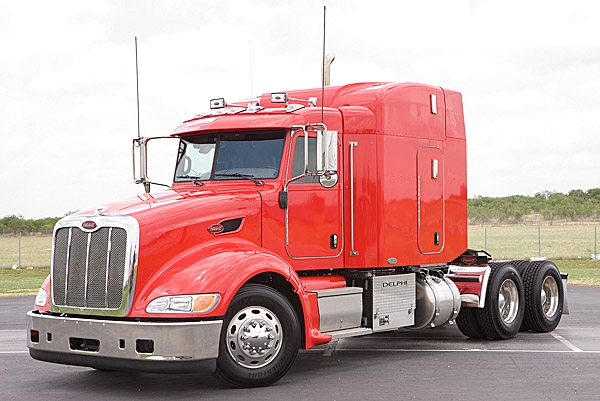Issued on: March 19, 2009
Solid Oxide Fuel Cell Successfully Powers Truck Cab and Sleeper in DOE-Sponsored Test
DOE, Delphi, Peterbilt Join to Test Auxiliary Power Unit for Commercial Trucks
Washington, DC —In a test sponsored by the U.S. Department of Energy (DOE), a Delphi auxiliary power unit employing a solid oxide fuel cell (SOFC) successfully operated the electrical system and air conditioning of a Peterbilt Model 386 truck under conditions simulating idling conditions for 10 hours. The device provides an alternative to running a truck’s main diesel engine, or using a truck’s batteries, to power auxiliary electrical loads during rest periods, thereby lowering emissions, reducing noise, and saving fuel.
|
|
 |
|
In testing at Peterbilt Motors Company Texas head-
quarters, a Delphi auxiliary power unit employing a
SECA solid oxide fuel cell successfully powered the
electrical system and air conditioning of a Peterbilt
Model 386 for 10 hours while the diesel engine was
off. The engine was restarted after 10 hours, simulat-
ing the beginning of the driver’s day. | | Funded by the Office of Energy Efficiency and Renewable Energy, the test was a collaborative effort that also involved the Office of Fossil Energy’s Solid State Energy Conversion Alliance (SECA); Delphi Corp., a leading global supplier of mobile electronics and transportation systems; and Peterbilt Motors Company, a manufacturer of premium quality trucks for a wide range of markets. The auxiliary power unit provided an average of 800 watts of electricity to the truck over the course of the test.
Concerns about commercial truck emissions, noise, and fuel consumption have led to legislation and other proposals to limit the trucks' idling time and have resulted in a need for clean, economical alternatives. Auxiliary power units that employ an SOFC are a promising solution.
Delphi's SOFC auxiliary power unit is able to convert the chemical energy in conventional fuels—in this case, commercial diesel—into useful electrical power without combustion. The unit is compact and can be configured to use natural gas, bio-diesel, propane, gasoline, coal-derived fuel, or military logistics fuel.
Auxiliary power is a spinoff application for SOFCs developed under the SECA program. SECA was established by the Office of Fossil Energy in 2000 to research and develop low-cost, modular, fuel-flexible SOFC systems by 2010. The ultimate goal of the program is to use low-cost SOFCs in coal-based power plants to take advantage of their higher efficiencies, lower emissions, reduced water requirements, and ease of carbon capture. During the development of SECA SOFCs, technological spinoffs into a variety of other applications and markets are expected. This will increase manufacturing production volume, thereby lowering SOFC cost.
- End of Techline
|